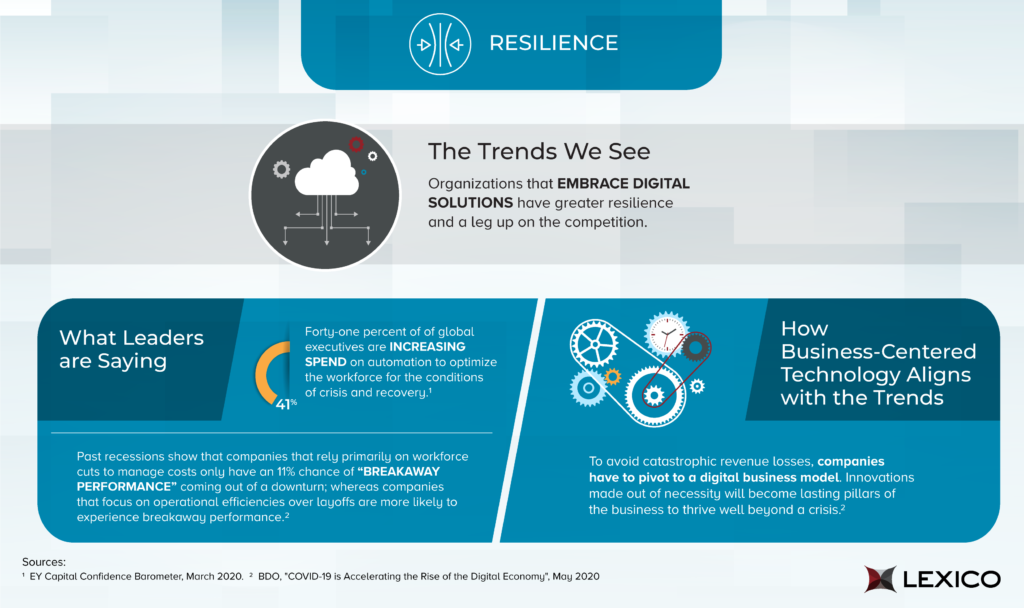Based on insights from business and technology leaders, we’ve created a new series on boosting digital transformation ROI through a business-centered technology approach. We’ve identified four key trends on this topic and are taking a deeper dive into each one, so you have a pulse on the ever-changing nature of digital transformation.
How Digital Transformation Helps Businesses
If there’s a silver lining to a crisis, it’s the resilience that it inspires in people. Organizations that embrace a business-centered technology approach are proven to be more resilient and as a result, more competitive, which is especially important when in the midst of adversity. Recent surveys show that C-suite leaders who are investing in digital transformation and basing those investments on business objectives are more likely to experience “breakaway performance” and get a leg up on the competition. This alignment of business objectives and technology initiatives can clear the way of any storms a crisis may bring.
What is Business Resilience?
Business resilience is the ability of a company to adapt and respond to changes and disruptions in its environment, while continuing to operate and achieve its strategic objectives. Business resilience involves the development and implementation of strategies, processes, and plans to enhance a company’s ability to withstand and recover from unexpected events, such as natural disasters, cyberattacks, or economic downturns. It is important to identify and assess potential risks and vulnerabilities, and develop plans to mitigate or manage them. Company leaders need to develop crisis management plans, business continuity plans, and disaster recovery plans. Supply chain resilience, data protection, and cybersecurity should also be considered.
Why is Reliance Important in Business?
Necessity is the mother of invention; or in today’s circumstances, innovation. C-suite leaders, faced with crisis, have pivoted to a digital business model that promises to have long-term benefit for the business to thrive beyond the lifespan of the crisis. The digital business model is not built on short-term cuts to headcount, but rather a more efficient operating model and more satisfying customer experience. In fact, C-suite leaders are investing heavily in automation to optimize their workforce in crisis and in recovery. The symbiotic relationship between business objectives and enabling technology is seamless in successful organizations.
The research we’ve seen reveals that C-suite leaders recognize the importance of digital transformation investment to strengthen their market position and their organization as a whole. Here is a closer look into the trend of Resilience that we’ve uncovered:
Trends In Business Resilience That We See
Organizations that embrace digital solutions have greater resilience and a leg up on the competition.
What Leaders are Saying:
- 41% of global executives are increasing spend an automation to optimize the workplace for the condition s and crisis and recovery
- Post recessions show the companies that rely primarily on workforce cuts to manage costs only have an 11% chance of “breakaway performance” coming out of a downturn; whereas companies that focus on operational efficiencies over layoffs are more likely to experience breakaway performance.
How Business-Centered Technology Aligns with the Trends:
- To avoid catastrophic revenue losses, companies have to pivot to a digital business model. Innovations made out of necessity will become lasting pillars of the business to thrive.
While there may be variance among industries, companies and even leaders about the impact of the pandemic crisis and where to go from here, there are some things leaders can count on. The fact that crisis can build your organization’s resilience is indisputable; however, in order for this to happen, your organization must have the mindset of business and technology leaders reaching across the aisle to partner in a business-centered approach to technology investment. These two facts, paired together, can deliver a greater return on investment and strengthen one’s market position, leading to breakaway performance both during a crisis and in the aftermath.
How Can You Make Your Business More Resilient?
Digital transformation can play a significant role in making a business more resilient and can make businesses more agile, efficient, and adaptable. By leveraging the latest digital technologies and strategies, businesses can enhance their resilience and prepare for the unexpected.
Cloud-based Infrastructure
Moving business operations to the cloud can provide more flexibility and scalability, enabling businesses to quickly adapt to changing circumstances. Cloud infrastructure also provides secure data storage and backup, making it easier to recover from unexpected events.
Digital Communication Tools
Digital tools such as video conferencing, instant messaging, and collaboration platforms enable employees to work remotely and communicate effectively, even during disruptions. This helps ensure business continuity and reduces the impact of physical location-based challenges.
Automation
Digital transformation can automate routine processes, reducing the reliance on manual processes, and increasing efficiency. Automation also minimizes the risk of human error, making the business more resilient to disruptions caused by human mistakes.
Data Analytics
Digital transformation can provide businesses with real-time data insights, enabling them to quickly identify trends, patterns, and potential problems. With this data, businesses can make more informed decisions, which can improve their resilience to unexpected events.
Cybersecurity
Digital transformation brings new risks, particularly in the form of cyber threats. To improve their resilience, businesses must implement robust cybersecurity measures that protect sensitive data and systems from cyberattacks.
In today’s rapidly changing and unpredictable business environment, the ability to adapt and respond to disruptions is essential for business success. Business resilience is the key to achieving this, and it requires a proactive approach to risk management and a commitment to continuous improvement. By developing robust strategies, processes, and plans, leveraging digital technologies, and fostering a culture of resilience, businesses can build the resilience they need to thrive in today’s uncertain times. Investing in business resilience is not only a smart business decision, but it is also an investment in the long-term success and sustainability of the business. With the right mindset and tools in place, businesses can weather any storm and come out stronger on the other side.

